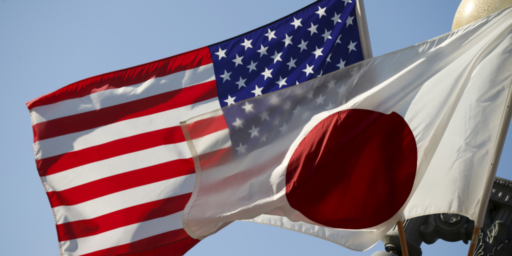The “Obama Era of American Retrenchment”?
 A president’s public statements on foreign policy have a number of audiences and can serve a variety of different functions. He may be speaking to the government of a prospective adversary or that country’s people, he may be be speaking to the governments or people of our allies, and, most importantly, he will be speaking to the American people. At their best presidential statements serve to inform and reassure the American people and the people and governments of our allies while warning prospective adversaries or inviting them to greater cooperation with us. At their worst they can reassure prospective adversaries while confusing or alarming the American people and our allies. That’s what the Christian Science Monitor is cautioning President Obama about in a recent editorial:
A president’s public statements on foreign policy have a number of audiences and can serve a variety of different functions. He may be speaking to the government of a prospective adversary or that country’s people, he may be be speaking to the governments or people of our allies, and, most importantly, he will be speaking to the American people. At their best presidential statements serve to inform and reassure the American people and the people and governments of our allies while warning prospective adversaries or inviting them to greater cooperation with us. At their worst they can reassure prospective adversaries while confusing or alarming the American people and our allies. That’s what the Christian Science Monitor is cautioning President Obama about in a recent editorial:
Tough talk against an enemy is sometimes needed simply to reassure America’s allies that the US will live up to its defense promises. Those commitments include its unique role to provide nuclear deterrence, or promised retaliation, if an ally is attacked.
By his actions and his words, Obama is sending worrisome signals to Japan and South Korea that they might be left alone in a confrontation with North Korea or even perhaps China.
It’s an impression he needs to correct quickly with credible reassurance.
The editorial goes on to list some of President Obama’s recent statements and proposed policies, contrast them unfavorably with those of former President Bill Clinton, and declaim:
All these moves help explain recent steps in Japan and South Korea to prepare for an Obama era of American retrenchment.
Presidents tend to enter office interested primarily in domestic policy; this is consistent with the views of most Americans who tend to be completely disinterested in foreign policy. However, due to the nature of the job foreign policy is thrust upon most presidents willy-nilly. It’s inescapable.
President Obama entered office with an enormous amount on his plate. The domestic economy, energy policy, healthcare policy, ongoing conflicts in Iraq and Afghanistan, and tremendous tensions in many disparate regions of the globe. While blaming his predecessor’s intransigence for stalemated diplomatic efforts on a host of fronts may be politically expedient and, at least in some degree, justified it takes two to tango and, at least so far, those whom we’ve attempted to bring to the negotiating table have become increasingly demanding rather than less so.
Since the end of World War II, the foreign policy view shared by all American presidents has been that American engagement with the world and American leadership have been profoundly stabilizing and have promoted peace and prosperity for us and the rest of the world and on net I still believe that to be the case. While I would like to see Japan, South Korea, and our European allies in particular undertake greater responsibility for at the very least their own security, I also believe that a distinct “American retrenchment” would have great risks, not the least of which is that it would reduce our ability to influence events. As Shakespeare put it “Nothing will come of nothing”.
It is still early in the Obama Presidency.






Seems to me we had a couple of instances (Gulf War I and Korea) where the conflict started because of misinterpretation as to what is and is not part of the line we draw in the sand. So beyond making others (Japan and S. Korea) nervous, I would be more concerned with making N. Korea ‘bold’.
I’m begining to wonder if perhaps Obama was not quite ready for being President. We saw some hints of this with his campaign and NAFTA and Canada. Hopefully he is a quick study.
Exactly so. As it happens, Victor Davis Hanson addressed this at PJM yesterday:
In my view, this economic situation is pretty much online with the foriegn policy Obama’s got himself pushing.
Ending American exceptionalism was always the goal of the progressives now in power. World government, you see, doesn’t fly if there’s exceptionalism in the world, which holds one nation higher than the rest. The power of unilateralism must be eliminated for a world government to gain power.
At every turn, everything Obama has done thusfar plays directly into the end game of a one world government, and lowering our status in the world to just another state subject to a world power. Every single thing. You seem to feel this unintentional… that he’s stumbing into it. I happen to think that direction intentional, because I know of no condition where someone can hit the mark so exactly, and so consistantly, without aiming for it. But even absent intent, he could hardly have moved us more exactly into the wet dreams of the socialist one worlders, than he has done.
INdeed, and I’ve long since begun to wonder if we will survive it.
Here’s a novel Idea…
Why not
1] Think and consider the consequences before you speak.
2] Carefully say what you mean and mean what you say.
This would cause great consternation among politicians on all sides until it was practiced long enough to prove true.
Hell, if tried, it might eventually work for elections too.
The problem is that American engagement simply isn’t sustainable. The United States currently has a higher defense budget than the rest of the world combine. If we cut the defense budget by 50% we would STILL be spending more than NATO, Russia, and China combined.
Given our rising debts and deficits, and given that entitlements are only going to be able to be trimmed on the edges, American retrenchment is simply the only viable option to avoid economic collapse. We can’t afford to be the world’s policeman anymore.
The Monitors editorial voice should be taken seriously. Alex makes a valid point as well.
I agree with your premise but come to the opposite (admittedly subjective) conclusion. The era of American leadership has been stabilizing but I think we’ve passed the point of diminishing returns and now face escalating losses if we continue to maintain this role.
We’ve gotten to the point where we are expected to bear the brunt of any military adventure the world deems desirable simply because we can and we have. This not only promotes irresponsible behavior by other countries (who believe we’ll pick up the tab) but also has come to create a not wholy inaccurate perception of America as an empire builder or colonial power.
It’s past time we took a step back and said “you know I think we’ve given you all a break, now its time for you to be responsible.
Uh huh.
And who pushed for those entitlements, again, Alex? Who was it raised the debt to the point where it is now? Look again at the Hanson quote.
Can it be that this path was taken with the specific intent of elimination of American engagement, as you call it?Or as I put it, lowering America’s status in the world? It seems far fecthed to you I’m sure, (understandable) but it meshes alarmingly well.
Eric,
Ummm, it was Bush who raised entitlement spending through Medicare. The CBO budget deficits that project the alarming growth in entitlement spending bases it on existing policy. In other words, assuming that Obama doesn’t touch it one way or the other.
Remember that part of Obama’s record deficit this year is as a result of the TARP program, which was pushed by the Bush Administration and Democrats alike–they both share the blame.
Are you saying that the Bush Administration was in on retrenchment and deviously manipulated TARP and increases in Medicare spending to make it happen?
Sounds a little far-fetched.
The fact is, we do need to curb entitlement spending, but that won’t be enough. We ALSO need to cut defense spending.
True enough, but there again, Bush is a centrist. Trying to get along. Going to stupid legnths to do it, as I’ve said for years… about both 41 and 43. So, I doubt 43’d have done that absent the pressure from the left and trying to keep them happy. A democrat dominated congress, in the second term an an almost invisable Republican majority in his first, (Along with the rino problem) and his course is pretty much guranteed to be growing government.
Same answer… with the addition that I doubt Bush would have taken things quite so far as Obama did, after inuguration. The results of increasing government because going along to get along is your thing, and increasing government because it’s your first answer to everything, are shown pretty clearly in the debt levels Victor mentions.
Absent governmental largess on things that government was never suppsoed to be doing in the the first place, Defense… the thing government IS supposed to be doing, at least if you read the Constituton, would need to be cut. In that particular, we’ve been 100 years on this path. But to mix metephors, it appears Obama’s actions have managed to shut the door behind us.
Correction:
/if you read the Constituton, would need to be cut. // if you read the Constituton, wouldn’t need to be cut. /
Eric,
I don’t think that entitlement spending is unconstitutional, but I agree that it’s out of control and that Republicans and Democrats share the blame for that.
And while Defense is certainly a justifiable government priority, it is not our priority to be the military for the whole world. The Founding Fathers were skeptical of standing armies, as am I. Eisenhower warned us about the Military-Industrial complex, and nothing that’s happened in the past 50 years has allayed his concerns. Our insanely high levels of Defense spending are vastly out of proportion with the need to provide defense from foreign invasion.
Alex, I think we need to be cautious about presenting false alternatives. Continued engagement with the world and reducing our military expenditures aren’t incompatible. We need to pick and choose.
The purpose of our military has never been construed as solely to “provide defense from foreign invasion”. That has been true from the very beginnings of the Republic and I believe that our military should continue to be used in the national interest. While I believe that interest should be more narrowly construed than it has been (I haven’t supported any of our military interventions over the period of the last 30 years), I think that pulling back to our shores would be very imprudent.
If there’s one lesson we should have learned over the period of the last seventy years it is that the oceans on our east and west coasts no longer provide a barrier against those who would do us harm.
However, IMO one thing we can’t afford to do is to confuse both our friends and enemies, discouraging the former and giving heart to the latter.
Dave,
I think we’re better off ceding our “leadership” role to multilateral institutions and pulling back from our military commitments.
Alex;
Ike, too, was a centrist, remember, though I daresay he’d be called Hitler as Bush was in today’s environment.
That aside; I submit that the founder’s judgements on a standing army, and to a lesser degree, Ike’s, were made within the context of a foriegn power taking months, (or days in the case of Ike) to get a force close to us. Obviously, those situations no longer obtain.
What was I saying about world government?
At this point all multilateral institutions depend on their member nations for military forces. If we continue to do what we’re doing now except in the name of a multilateral institution, where’s the cost savings? Our allies in the multilateral institutions of which we’re currently a member are highly unlikely to make up any deficit that results from our reducing our forces.
Are you arguing for a standing army under the flag of a multilateral institution rather than the member nations? Trusting to the good will of others to look after our interests?
As I said above, I think we need to pick and choose. Eliminate some military spending; retain other military spending. I don’t think we should wrap ourselves in our cloak and sweep off to meditate on our sins.
“The United States currently has a higher defense budget than the rest of the world combine.”
A demonstrably unreliable, if not false, metric. No one else has our responsibilities nor our capabilities. I ditinctly remember this same statistic being trotted out 10 yrs ago when Clinton was under pressure to increase defense spending.
Please update your talking points.
What is the current percentage of GDP that is committed to Defense, 4.7 percent? This is a more useful metric, IMO. On average, we sustained a level higher than this (6.25; 5.35 since 1962). throughout much of the post-WWII period.
“…distinctly remember…”
Right-wing paranoid delusions…what evidence do you have to back up this ridiculous assertion…
Umm, not really…the person today who would probably be most like Ike would be Colin Powell and he wouldn’t have to worry about being called Hitler by anyone, but he would be called some nasty things by people like you…
…just like Ike was attacked by the John Birchers, I might add…
Heh… you did read all of that, right?
Nah. RINO is about the extent of it. But I do seem to recall the left making some very interesting noises just after 9/11 about him. Seems to me I wrote something to that point at the time. I’ll have to see if it’s still online.
Our “responsibilities” and “capabilities” have nothing to do with the question of whether we spend more than the rest of the world combined on military assets, a fact which is neither false nor “unreliable” (what does that even mean?).
it’s all in black and white here. The US spends 600 billion while the rest of the world combined spends 500 billion (stats from 2004). 600 is in fact more than 500.
China, despite having 4x our population and trying to aggressively modernize their military spends 1/10 what we do.
“China, despite having 4x our population and trying to aggressively modernize their military spends 1/10 what we do.”
“In 2009, the US Department of Defense’s annual report to Congress on China’s military strength offered several estimates of actual 2008 Chinese military spending. In terms of the prevailing exchange rate, Pentagon estimates range between US$105 and US$150 billion.”
I’m not going to do the math for you on this one. Hint: It’s more than 10 percent of what we spend.
BTW, I had a drink and a talk with a PLAN officer while in Shanghai a few years back. In the course of our conversation, we did a back of the cocktail napkin (literally) purchasing power parity comparison on military pay. We came to the conclusion that U.S. troops, on average, earn about 20x more than PRC troops (conscription vs AVF has a lot to do with this). Because my chinese “friend” was a mid-grade officer, the difference was only about 10x. More drinks were required in order for him to save face.
“…(N)or “unreliable” (what does that even mean?).”
It means that it’s not an apple to apple comparison, so therefore, it leads to inaccurate or “unreliable” conclusions. I insist, capabilities are a better metric; what do you get for your 600 billion?
Be sure to add the psychological (Foreign policy) value to your measurement of what do you get for the 600 billion. Some (obviously) will take that value as a negative. I’m not among them.
“Be sure to add the psychological (Foreign policy) value to your measurement of what do you get for the 600 billion.”
You’re spot on with that comment.
In my initial post on this subject, I failed to bring this out and chose to highlight other realities (“No one else has our responsibilities nor our capabilities.”). OTOH, if you’re an opponent of defense spending, it’s all about the benjamins. That other stuff: capabilities, responsibilities and the diplomatic leveraging of “hard” power”, that’s only so much static.
The much vaunted, if not overvalued, “soft power” is only possible through the hard power that the hundreds of billions in annual defense spending buys. We get a lot of people’s attention because we can both talk-the-talk and walk-the-walk, our occasional misapplication of that power not withstanding.
Some so-called “rising powers”, Europe’s impotent, though highly-opinionated mandarins, and our domestic high chair pounders resent us for this.
Awww…it’s always so cute to watch some people wax lovingly about our military might…and of course such praises are usually followed by the predictable descriptions of all the various groups of the jealous, the pussies, and of course our country’s own America-haters who all resent that military might…
Yeah, like Iraq…it’s nice to see our money (well, actually, China’s money, but I digress) so well spent…
“…well, actually, China’s money…”
In a way, it’s all China’s money, isn’t it?
Oh, and until “…the jealous, the pussies, and of course our country’s own America-haters” sack up and articulate a substantive alternative (other than the predictable snark, ad hominem, and condescension), there will continue to be “predictable descriptions.”
Well, that and a reputation for using it.
If this goes back to a question that was thrust at me some time ago about why North Korea would be at all concerned about the politics and the United States. ‘rats as a rule are not noted for willingness to use “hard power” to reinforce U.S. interests.
But surely there is a middle-ground? Or does everyone who disagrees with the size and expense of our military fall into one of those three categories? In regards to the alternatives…obviously when it comes to countries like North Korea and Iran, we can use military force, use diplomacy, or do nothing…poor dear, I would imagine that it disappoints you that we aren’t using that first option…
Awww…what a shame that the “‘rats” aren’t as bloodthirsty as you’d like…the term “domestic high chair pounders” was used earlier…that term would seem to perfectly fit those who blunder around whining (dare I say in a predictable fashion) about how the military option is so underutilized…why, it’s amazing our country still exists since we seem to be so loathe to use our shiny war toys…
“But surely there is a middle-ground?”
Yes, there is, and I’m willing to discuss what this might be. Unfortunately, I don’t hear much talk about it around here.
Too big? Too expensive?; Why? And relative to what, that we spend almost 600 bil per and that’s more than the next 5 guys combined? That’s dollar sign eye-candy, not a valid threat / capabilities comparison.
I’m only “disappointed” that we aren’t using military power when diplomacy has clearly run it’s course and the bad case de jour will not improve with age. In the case of N.K. and Iran, having no good choices is not an excuse for not choosing.
We are entering a period of drastically constrained circumstances, I get that. Let’s identify the threats, procure the required capabilities and then do the hard work required to cut what is no longer needed. Unfortunately, we need a lot.